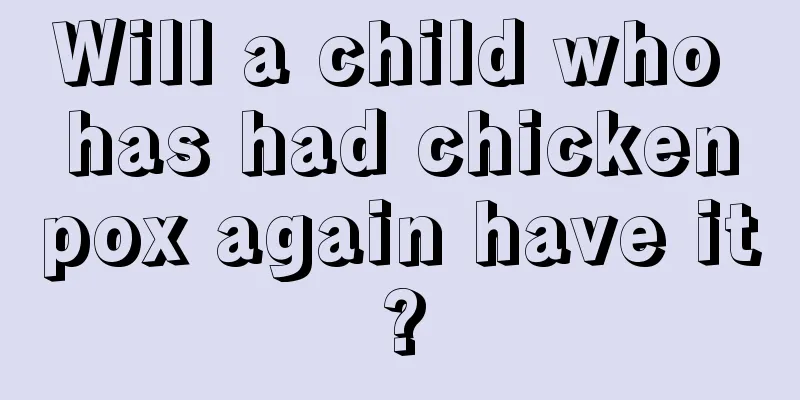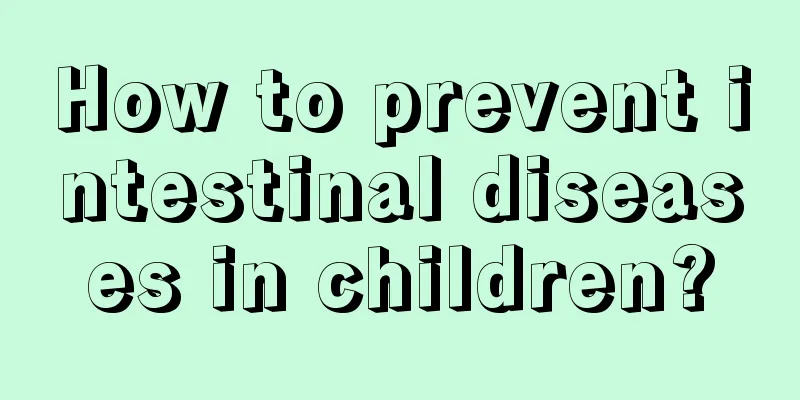Will a child who has had chickenpox again have it?

|
In our lives, it is very common for children to get chickenpox, and chickenpox is a particularly serious infectious disease. In ancient times, this kind of chickenpox was called smallpox, and the probability of survival was very low. In modern times, these chickenpox are more common, and the probability of cure is very high. However, if you still feel itchy, scratching with your hands may leave scars. So, will children who have had chickenpox have it again? Causes of chickenpox in children Children are more susceptible to chickenpox because chickenpox is highly contagious, has a wide range of transmission routes, and has low immunity in children. Mothers may wish to look at the reasons why children are prone to chickenpox, and take relevant measures to reduce the chances of children getting chickenpox. 1. Chickenpox is highly contagious. First of all, chickenpox is an epidemic virus that is highly contagious. 92% of susceptible people will become ill after coming into contact with children who are suffering from chickenpox. Secondly, children with chickenpox become the main source of infection for the virus and are contagious 1-2 days before the rash appears and a week after the appearance of the rash. Finally, children may also develop chickenpox if they come into contact with someone with shingles. 2. Chickenpox is transmitted in a wide range of ways. Chickenpox is mainly transmitted through direct contact and saliva. Even at close range and within a short period of time, it can be transmitted indirectly through healthy people. This route of transmission means that it is difficult to prevent. As long as children come into contact with people with chickenpox and have not been vaccinated themselves, the chances of infection will be very high. 3. Children’s immunity is low. Low immunity in children is also one of the reasons why they are susceptible to chickenpox virus infection. Children's immune systems are not yet fully developed, so it is difficult for them to resist infection with the chickenpox virus. 4. Infection through the mother. Generally speaking, babies under 6 months old can obtain antibodies from their mothers, so babies in this period basically will not get chickenpox. But there are some individual cases where the pregnant mother contracts chickenpox during pregnancy, in which case the baby may be infected. Babies can gain long-lasting immunity after having chickenpox, but there is still a chance of developing shingles. How many days does it take for a child to recover from chickenpox? Chickenpox is a highly contagious disease caused by the varicella-zoster virus, which is transmitted through droplets (such as sneezing) or contact. The contagious period of chickenpox is from 1-2 days before the rash appears until the lesions form scabs, about 7-8 days. If a mother is infected with chickenpox in early pregnancy, it may cause multiple malformations in the fetus; if the mother gives birth a few days after having chickenpox, it may also cause chickenpox in the newborn. The general population is susceptible to chickenpox, especially children, with preschool children aged 2 to 6 years old being the peak incidence group. It occurs more frequently in winter and spring. The incubation period of chickenpox is 12-21 days, mostly two weeks. It is characterized by fever, systemic red maculopapular rash, herpes and scabs. Chickenpox often appears in batches, starting as a small red dot, turning into a blister, then collapsing, and finally forming a scab, so the shape of chickenpox seen in different children is different. Chickenpox grows centripetally and is more common on the head, face, chest, proximal limbs and other parts of the body. In addition, ulcers may also appear in the patient's mouth, nose, vulva and other parts of the body. The answer to whether chickenpox is contagious is yes, because chickenpox is caused by infection with the varicella-zoster virus, and its transmission routes are widespread and common, mainly through respiratory droplets or direct contact. The varicella virus is highly contagious and can be transmitted through the air or through contact with patients or their used clothing, bedding, and utensils. Therefore, when children are being treated for chickenpox, special care should be taken to prevent them from scratching the affected area with their hands, which may aggravate the infection. The effective way to prevent chickenpox is to get vaccinated against chickenpox. If a child is diagnosed with chickenpox, it is best to ensure that the child is isolated and treated until all the scabs have formed. In addition, you should prevent secondary skin infections and keep your skin clean to avoid itching. |
<<: What kind of honey is suitable for children
>>: What are the early symptoms of brain tumor in babies?
Recommend
What are some ways to improve children's memory?
Children have poor memory, cannot remember what t...
What to do if children have vulvitis?
Many people are suffering from vulvitis. The main...
Can babies with skin allergies take a bath?
Many babies have allergic skin. They will have al...
Is it okay for a baby to drink milk while sleeping?
The baby's life has no regular pattern. He cr...
What to do if the baby has bleeding gums due to inflammation
Many people always think that babies do not have ...
What medicine is good for babies to take to fight viruses?
Viral infections can cause many diseases, the mos...
What are the symptoms of meningitis in children?
Meningitis in children can cause great harm to th...
Is it normal for baby's stool to be green?
All issues related to the baby's health and d...
At what age do children start to replace their first teeth?
As we all know, children will change their teeth ...
Benefits of eating raw carrot juice for babies
Carrot is a food we often eat in our lives. It is...
How to reduce swelling and stasis after a child falls
Children are lively and active by nature. They ru...
What should I do if my baby has eye mucus after waking up?
For newborn babies, since their resistance is rel...
Introduction to October Baby Food Recipe
Every child is the apple of his or her parents’ e...
Can babies eat cabbage?
Cabbage is a very common vegetable in our lives. ...
How to enhance children's immunity
Children are in a very important stage of growth ...









